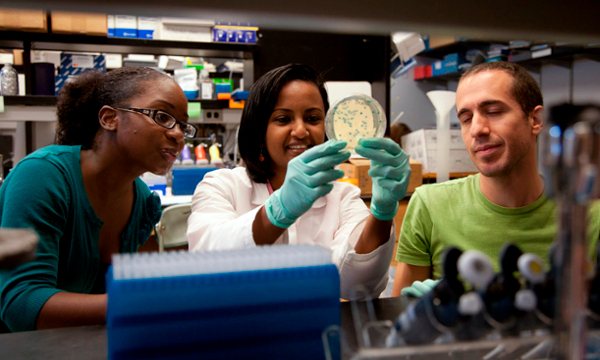Neuroscience Graduate Program at Emory University
About the Program

The interdisciplinary nature of Emory's Neuroscience Graduate Program allows students to pursue their research interests in a variety of areas.
Over the past decade, many renowned scientists have joined Emory's faculty, dramatically expanding its neuroscience research to aid graduate students in designing and executing complex experiments that result in groundbreaking discoveries about the human brain.
The breadth of expertise in cellular, molecular, behavioral, and systems neuroscience that our faculty members possess provides an unequaled educational environment for graduate students.
The program draws together over 120 neuroscientists from 22 University and Medical School departments as well as Emory's National Primate Research Center, collaborating Centers for Disease Control (CDC) scientists—and many others.
Emory University's Neuroscience Graduate Program is among the country's top 10 neuroscience graduate programs. This ranking is based on a number of factors, including our faculty's excellent credentials and research funding:
- Pharmacology, which is ranked number one in the world by The Scientist magazine for impact on pharmacology and toxicology research
- Neurology, which is ranked third nationally in total NIH funding
- Psychiatry and Behavioral Sciences, which is ranked ninth nationally in total research funding
- Rehabilitation Medicine, which is ranked fourth nationally in total NIH funding
This close-knit yet expansive community fosters an atmosphere of collaboration and support that helps our graduate students develop into leaders in the field.
Learn More Meet Our Community
Research
Offers research opportunities in computational and functional imaging studies of brain alterations in drugs dependence, neurobiology of learning and memory, alterations of cognitive function in ageing, psychobiology of motivation, regulation of neuroendocrine functions, molecular and neurochemical substrates of social behavior and fear conditioning, functional integration of motor and vestibular information in control of eye movements, neural basis of visual attention and neural substrates of motor control in normal and pathological conditions.
Offers research opportunities that use mathematical or computational tools to better understand the nervous system. Experimental techniques include the creation of neural hybrid systems - interfaces between biological neurons and computer-simulated or micro-engineered components; and real-time feedback control allowing computational analysis of an ongoing data stream to be used to dynamically interact with the biological preparation.
Cellular, Molecular, and Developmental Neuroscience
Offers research opportunities that explore mechanisms of signal transduction by neuromediators, basic mechanisms of neurotransmitter release, synaptic transmission and vesicle trafficking, structure-function of ion channels, calcium signaling, synaptic plasticity, neuronal modeling, molecular substrates of drug addiction, schizophrenia and neurodegenerative diseases as well as mechanisms that regulate social behaviors.
Offers research opportunities that explore neurobiological substrates of social and affiliative behaviors, fear, anxiety, stress and depression. Studies of G-protein-coupled signal transduction pathways as well as behavioral, molecular and physiological studies of drugs of abuse and glutamate receptor functions in epilepsy and neurodegeneration are additional assets of this program.
Neurological and Psychiatric Diseases
Offers research opportunities that explore the combination of basic and clinical research to understand the neurochemical changes that underlie psychotic and neurological disorders. These research areas include a broad range of projects that span from basic in vitro and in vivo mechanistic studies in cell culture and animal models to clinical studies in patients.
Motor Control and Movement Science
Offers research opportunities that explore the mechanisms of vestibular and visual integration into control of eye movements, cellular mechanisms of rhythmic pattern generators, spinal motor mechanisms and neuromuscular physiology, physiology of oculomotor behavior, pathophysiology/treatments of Parkinson's disease, and motor rehabilitation following stroke.
Offers research opportunities that explore the neural substrates of learning and memory, cognition and attention, decision-making and reward, cross-modal interactions between sensory systems, mechanisms of vestibular and visual integration into control of eye movements, anatomy and physiology of the basal ganglia, physiology of oculomotor behavior, and central regulation of autonomic functions.
Faculty
Meet our Faculty Join our Faculty
Alumni

NS graduates are highly sought after by employers in various industries, including pharmaceutical companies, medical service companies, and government agencies. They work as researchers, laboratory managers, and technical specialists in the industry and pursue independent research careers at universities or medical schools.
Life at Emory & Atlanta

Life at Emory University is one of the most exciting and intellectually stimulating experiences you could ask for.
A diverse, inclusive community welcomes students and faculty from all over the world. You'll find plenty of opportunities to get involved in campus life—and many resources available that will help you thrive as an Emory student.
The university has consistently ranked among the top 20 institutions nationally for NIH research support and was named one of the "New Ivies" by Newsweek—a tribute to both its academic excellence, as well as dedication to teaching.
Our faculty members are some of the most distinguished scholars in their fields and work closely with undergraduate students on research projects, independent study courses, or senior thesis projects.
Located just 6 miles northeast of downtown Atlanta, Emory's 704-acre campus is in a beautifully wooded area that offers students a peaceful environment to study but also provides easy access to Atlanta's bustling cultural scene.











